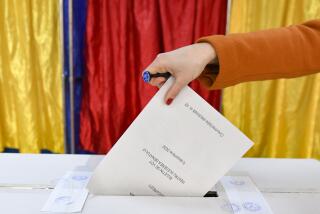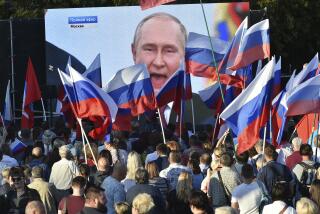Think Tank Urges West to Be Wary of Gorbachev
- Share via
LONDON — Soviet President Mikhail S. Gorbachev “is not now, and probably never was, prepared to see his country move all the way to liberal market economics or true democracy,” a major think tank asserted Thursday, warning that the West should be wary of supporting the Kremlin’s embattled leader further.
With economic collapse and ethnic strife threatening his country, “Gorbachev’s belated awakening to what he has wrought has turned him in the direction of repression,” the annual strategic survey of the International Institute of Strategic Studies reported.
The institute warned that the West’s continued embrace of Gorbachev and his policy of perestroika could affect President Bush’s vision of a “new world order” emerging from the U.S.-led coalition’s victory in the Gulf War.
In 1991, Gorbachev’s perestroika , or program of reform and restructuring, is vastly different from the way he originally presented it, the institute noted.
It added: “Tragically, (the Soviet Union) seems more likely to go down the road toward repression and military confrontation than toward democratization. It must now be asked if the policy of banking exclusively on (Gorbachev) can any longer be politically sustained . . . .”
The Gulf War demonstrated that “the U.S. is now the world’s only superpower,” the institute said, adding that “the implications . . . for the future of Europe are unclear. The war highlighted the national differences within Europe. This disarray has been claimed as vindication by both sides on the debate over European integration.”
As for other major nations, the report said: “Japan provided further indications that it is not ready for a role as a world leader.
“The Soviet Union,” it continued, “came out of the crisis with its pretentions to be an important voice on the world scene badly dented. Soviet military influence suffered even more than Soviet diplomatic influence.”
But Bush’s vision of peace and global cooperation--his “new world order”--also has been dented by the postwar actions of Iraqi President Saddam Hussein, who has “brutally suffocated an uprising that the President of the United States had effectively requested,” the report said.
More to Read
Sign up for Essential California
The most important California stories and recommendations in your inbox every morning.
You may occasionally receive promotional content from the Los Angeles Times.













